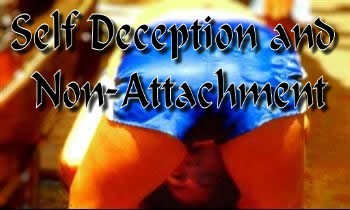Self Deception and Non-Attachment
Synopsis: Self Deception and Non-Attachment — non-attachment is about not biting, and if you do bite, spitting out the hook.

I got another question, and boy do I love ‘em.
You wrote about forgiveness at my request and you linked to the idea of letting go and the act of ‘putting it down’. That was awesome because putting it down is more doable than letting it go, for me. Loved it. Similar to the idea of letting it be. I just appreciated your idea of putting it down. So… what do you find as the difference and similarity between forgiveness and surrender?
It’s not about forgiveness, or about surrender. It’s about semantics vs. acting.
See, here’s the thing. People use the endless analysis of words and concepts to justify staying stuck. They endlessly look for the right description or descriptor, and that seems to them to actually be doing something.
The story we tell ourselves, the words we use to describe ourselves, are convenient fictions. Acting differently, on the other hand, is hard.
Another friend just wrote to me. She’s in the throes of a spring romance. The guy seems to be (haven’t met him; just have her descriptions) interested in dialogue and honesty. This is something she has never had before, although she swears it’s what she wants.
He’s asked her probing personal questions designed to deepen the relationship. She remains mute — which was her problem in the past.
Her dilemma? “Since I’ve never had a relationship where I communicated, how can I communicate?”
Now, she’s been to The Haven and learned their Communication Model, and has learned from me how to be honest. I’m sure, though, she’d argue that those things were just practice, and this is real!
So, what’s going on here?
She, like my friend who asked the opening question, wants to stay stuck, because shifting things is hard work.
Back to the first question — what, really, is the difference between “putting down” and “letting go?” Some might argue that, if I put something down, I can pick it up again, whereas letting go implies, well, letting go, permanently.
But really, dancing around on the semantics of there words begs the question: what are you willing to do differently, next time?
20 plus years ago, I had a major crisis on my hands (I wrote about it in the Deconstruction chapter of This Endless Moment 2nd. edition.) I was furious with a couple of people. My anger could have kept me a prisoner — I could have stayed stuck instead of moving on.
I don’t think I exactly planned it, but every morning for 2 years, as I had my morning shower, I’d let myself “pick up” or dwell on what I was angering myself over. I’d yell, cry, whatever. And I made a deal with myself. I’d do it until I didn’t need to anymore.
The other part of the deal was: when I got to towelling off, I’d calm myself ad drop my drama.
So, that’s what I did. for about 2 years. The rest of the time, I got on with living my life in the most elegant way I could.
“How can I talk to someone when I’ve never done that before” is kind of a silly question. You learn to talk to someone by… wait for it… talking to someone!
I’ve never met a natural communicator — someone who just knows how to, and does — good communication.
One woman we knew had taken tons of Haven courses, and yet, when she upset herself, she’d run around screaming and acting all hysterical. We’d have to wait for her to calm herself down — Then, we’d talk.
Darbella tended toward curling up in a ball when confronted with a sticky issue, whereas I tend to bluster, pout, and sulk. Needless to say, if we let our “normal, learned behaviour” run amok, we’d have lasted 35 seconds as opposed to 35 years.
Forgiveness and Surrender
As to the opening question’s ending sentence, both of these things are just semantics. Forgiveness is a self-directed act of stopping yourself from blaming, because when you don’t “forgive,” the only one who gets hurt is you.
Surrender is a loaded term, and gets confused with being forced to yield. We can loop down a rabbit hole with it. Surrender what, to whom, why? Seems like a good word to get yourself stuck — and guess what? The end result is non-action.
So, I choose the word non-attachment for all of this.
And what am I non-attached to? In this context, I’m non-attached to my stories, my evasions, and my unwillingness to act differently.
In other words, I recognise that what I do is who I am. Notice I did NOT say, “Who I say I am…”
No one is their story. Everyone is their behaviour.
Of course, the next thing out of people’s mouths is: “It’s not fair! Other people act like assholes and I’m just supposed to give in?” That’s not what I’m saying.
The non-attached person accepts that others will act as they act. Getting hooked into (attaching to) their behaviour, and then choosing to act stupidly in response is how one screws up. Royally.
The non-attached person has their feelings, but has them safely… perhaps for years, while showering



